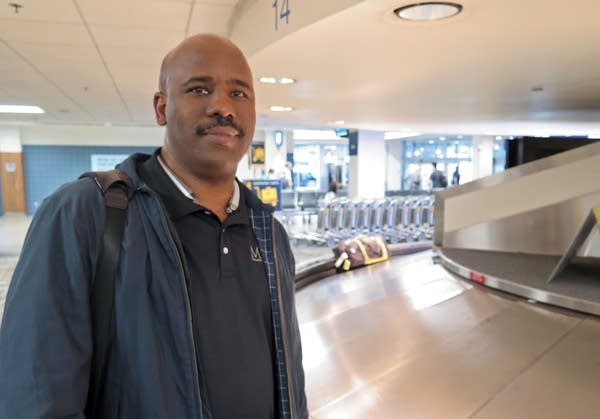Travel websites worry Congress will doom their business with new proposals

Go Deeper.
Create an account or log in to save stories.
Like this?
Thanks for liking this story! We have added it to a list of your favorite stories.
At the Twin Cities airport, you'll find a lot of bargain-hunting travelers who shop comparison sites to land the best airfares.
Marcus Drayton of Roseville said it may take some work, but it can really pay off.
"It's just the way it is," he said. "It's just like how you would check when you're going for anything, right?"
Drayton is pretty happy with the fares he finds and the competition that helps keep ticket prices in check.
Turn Up Your Support
MPR News helps you turn down the noise and build shared understanding. Turn up your support for this public resource and keep trusted journalism accessible to all.
"You have marketers coming in and trying to come up with new models — break the traditional models. And you have mainstream airlines responding in kind. I think that's what capitalism is all about," Drayton said.
But Elaine Pierce of Big Sky, Mont., said she's had some exasperating experiences with Expedia.

"I just wasn't able to control my ticket. I wasn't able to upgrade it, change it," she said.
Congress is weighing measures designed to address complaints like that, including one that Minnesota Sen. Amy Klobuchar is backing. The proposals, which vary in scope, would require travel sites like Expedia and Travelocity to give customers more information and control over tickets. The requirements would extend to matters such as seat assignments, refunds and baggage fees.
The big online ticket agents may not display baggage fees, for example, but the expense can add up. So what initially looks like the cheapest fare could be the most expensive after those charges are applied.
"No matter where consumers shop for flights online, they shouldn't be saddled with unexpected seat changes, outdated or incorrect travel itineraries, or hundreds of dollars in unknown fees that can mean the difference between a family trip being affordable or unaffordable," Klobuchar said in a statement. "Increasing transparency will help consumers make more informed travel decisions up front."
Travel sites worry Congress will impose requirements they're unable to fulfill, because the airlines control baggage fees, schedule changes and other policies, and may not fully share the information.
"These proposals would put ticket agents in an untenable position where they simply cannot comply because they don't have access to the information," said Steve Shur, president of the Travel Technology Association, whose members include Expedia, Orbitz and Priceline. "They may have access to some of it, not all of it. There's no guarantee that they're going to have."
Klobuchar is backing legislation that would require services like Expedia and Orbitz to provide airline fees and other information to the extent practical. The House bill doesn't provide travel sites as much flexibility.
The Klobuchar proposal does not address ticket refunds — a complex issue, since some travel sites actually issue plane tickets and others don't. A bill in the House would require travel sites to take responsibility for refunds.
Kevin Mitchell, who heads a business travel group and is a frequent airline critic, worries lawmakers will give the airlines the power to kill off travel websites by simply withholding information.
"It's a very Orwellian type of approach. They simply will not be able to comply with the legislation. Therefore, they get shut down," he said.
The airlines and travel sites have a complex relationship. The airfare comparison services sell a lot of tickets. Most airlines provide them with fare and flight information, as well as a cut of ticket sales.
The airlines are not trying to kill price competition, just ensure that non-airline sites provide the same level of service the carriers do, said Vaughn Jennings, spokesperson for the trade group Airlines for America.
"No matter where travelers purchase their ticket, they should be protected by one level of transparency and customer service," Jennings said, "whether it's providing prompt refunds, disclosing cancellation policies, notifying consumers of itinerary changes or simply responding to customer complaints — and that includes online travel agents."
But some consumer and business groups contend that the airlines want to make comparison shopping harder and less fruitful, enticing consumers just to go to an airline's website. That would save the airlines the cost of paying a middle-man.
"The airlines hate the ability of passengers to price shop," said Paul Hudson, president of the nonprofit group Flyersrights.org. "Their general interest is to reduce or eliminate the ability of consumers to price shop."
Still, Hudson doesn't oppose the Klobuchar proposal. He said it's a step forward because it would reduce unpleasant and sometimes expensive surprises for travelers.
Consumers Union hopes that, despite all the squabbling and fears, Congress will approve legislation that results in better service for consumers, wherever they buy their plane tickets.
"We want them to be able to conveniently comparison shop," said George Slover, an attorney with the publisher of Consumer Reports. "Third-party sellers are a big part of making that happen. Of course, any new requirements have to be workable, for third-party sellers and for airlines."


